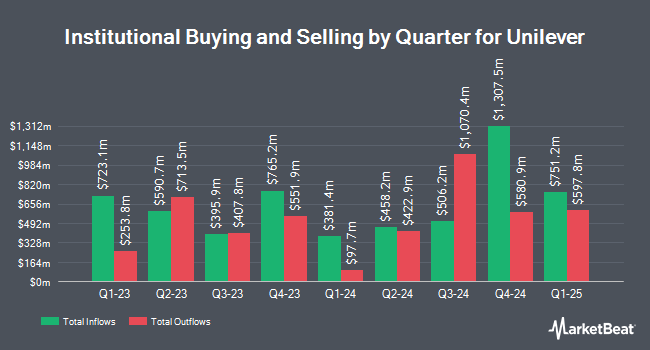Cetera Investment Advisers grew its stake in shares of Unilever PLC (NYSE:UL - Free Report) by 6.1% in the first quarter, according to its most recent filing with the Securities & Exchange Commission. The firm owned 239,802 shares of the company's stock after acquiring an additional 13,785 shares during the period. Cetera Investment Advisers' holdings in Unilever were worth $14,280,000 at the end of the most recent reporting period.
A number of other institutional investors and hedge funds have also recently modified their holdings of the stock. Vermillion Wealth Management Inc. purchased a new stake in shares of Unilever during the 4th quarter valued at approximately $30,000. Richardson Financial Services Inc. lifted its stake in Unilever by 209.0% in the 1st quarter. Richardson Financial Services Inc. now owns 618 shares of the company's stock worth $37,000 after purchasing an additional 418 shares in the last quarter. Accredited Wealth Management LLC purchased a new stake in Unilever in the 4th quarter worth approximately $43,000. Greenline Partners LLC purchased a new stake in Unilever in the 4th quarter worth approximately $58,000. Finally, Opal Wealth Advisors LLC purchased a new stake in Unilever in the 1st quarter worth approximately $63,000. 9.67% of the stock is owned by institutional investors.
Analyst Upgrades and Downgrades
UL has been the topic of a number of research analyst reports. BNP Paribas raised shares of Unilever to a "strong-buy" rating in a report on Thursday, May 29th. BNP Paribas Exane initiated coverage on shares of Unilever in a report on Thursday, May 29th. They issued an "outperform" rating and a $73.00 price target on the stock. UBS Group raised shares of Unilever from a "strong sell" rating to a "hold" rating in a report on Friday, May 2nd. Finally, Wall Street Zen lowered shares of Unilever from a "buy" rating to a "hold" rating in a report on Tuesday, May 6th. One equities research analyst has rated the stock with a sell rating, three have issued a hold rating, three have given a buy rating and two have issued a strong buy rating to the company's stock. According to MarketBeat.com, the company presently has a consensus rating of "Moderate Buy" and an average price target of $72.50.
Read Our Latest Analysis on Unilever
Unilever Trading Down 0.5%
NYSE UL traded down $0.30 during trading hours on Wednesday, hitting $59.03. 2,249,587 shares of the company's stock traded hands, compared to its average volume of 1,967,835. The business's fifty day moving average price is $61.83 and its two-hundred day moving average price is $60.16. The firm has a market capitalization of $144.84 billion, a P/E ratio of 16.91, a P/E/G ratio of 3.77 and a beta of 0.41. Unilever PLC has a 52 week low of $54.32 and a 52 week high of $65.87.
Unilever Profile
(
Free Report)
Unilever PLC operates as a fast-moving consumer goods company in the Asia Pacific, Africa, the Americas, and Europe. It operates through five segments: Beauty & Wellbeing, Personal Care, Home Care, Nutrition, and Ice Cream. The Beauty & Wellbeing segment engages in the sale of hair care products, such as shampoo, conditioner, and styling; skin care products including face, hand, and body moisturizer; and prestige beauty and health & wellbeing products consist of the vitamins, minerals, and supplements.
Read More

Before you consider Unilever, you'll want to hear this.
MarketBeat keeps track of Wall Street's top-rated and best performing research analysts and the stocks they recommend to their clients on a daily basis. MarketBeat has identified the five stocks that top analysts are quietly whispering to their clients to buy now before the broader market catches on... and Unilever wasn't on the list.
While Unilever currently has a Moderate Buy rating among analysts, top-rated analysts believe these five stocks are better buys.
View The Five Stocks Here
With the proliferation of data centers and electric vehicles, the electric grid will only get more strained. Download this report to learn how energy stocks can play a role in your portfolio as the global demand for energy continues to grow.
Get This Free Report
Like this article? Share it with a colleague.
Link copied to clipboard.